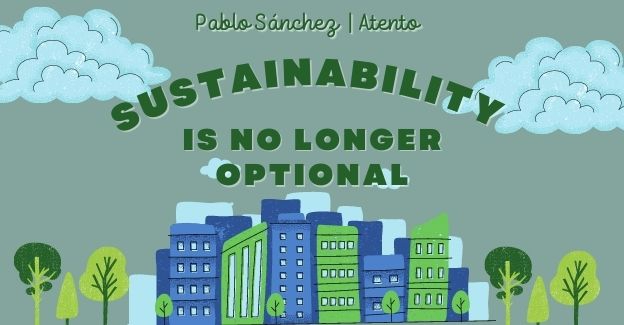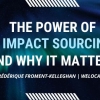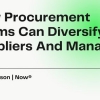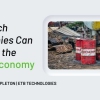Companies need to show their cards when it comes to ESG, says Pablo Sánchez, Global Chief Marketing Officer and ESG Director at Atento. He makes the case to prove that your company’s actions on sustainability are not purely lip service.
Environmental, Social and Governance (ESG). It’s not a new term: its origin dates back several decades, but it has gained increasing importance in recent years.
This might have something to do with the fact it’s been proven that companies with a good ESG plan are more sustainable, deliver better service and reduce investment risk. And of course, instilling an ESG plan is not only a commitment to the environment and employees. It also covers customers, suppliers, shareholders and the communities in which the entire entity operates. And when you hear that, it seems clear it’s something that we should all be doing.
But, incorporating ESG into business objectives is perhaps easier said than done. First, because it means pinpointing compelling and attainable actions that will resonate with those objectives it aims to accomplish. And second, because, with a vision of continuous improvement, companies must renew their objectives on a regular basis and work hard with teams internally to bring those goals to fruition so they can continue to promote their sustainable and responsible activities.
Likewise, on the part of Governance, practices such as corporate ethics, audits, compliance with regulations, data protection or ensuring transparency in operations are by no means an easy feat.
So, let’s take a closer look at some of the many opportunities and pitfalls for integrating an ESG plan in the Business Process Outsourcing (BPO) sector.
Diversity, Equity and Inclusion
As is name implies, this entails creating an inclusive culture in which people feel like they belong and are empowered so they can thrive at work. It is not just enough to have diverse representation in the organization, but an inclusive culture must also be embedded into corporate culture.
It’s important that the executives of an organization are responsible for transmitting the values of equity and inclusion in a top-down approach, so that this procedure is part of the entity's DNA, at all levels of the company and in all regions.
The BPO sector has been a pioneer for hiring diverse talent. In my experience, this is an industry where you can see people from all ethnicities, religions and sexual orientations, to name just a few diversity dimensions, and inclusive work practices may have something to do with this.
Facilitating remote working options so that location does not prove to be a barrier to accessing certain jobs can provide benefits to many employees. Of course, that also requires recruitment and onboarding processes to be remote in nature, so that people are not excluded depending on where they reside.
By providing equal opportunities for all employees, organizations can benefit from diverse talents, ways of thinking and experiences. Diversity also means different points of view for problem solving or decision-making, which can enrich conversations and ultimately benefit the future of the company.
Environmental Sustainability
Caring for the environment is another area where companies can contribute. Yes, even those that are not within the manufacturing industry. Environmental objectives that reduce waste production, promote energy efficiency or generate a circular economy to become carbon neutral by 2030 are just a few areas where there are opportunities for improvement.
Of course, setting measurable and real objectives will be required to bring about a real impact on the environment and they should be reviewed on a frequent basis. One measure often taken to reduce the CO2 footprint linked to modern technologies includes switching to the cloud, where possible.
This particular action can have a knock-on effect elsewhere, too, given that cloud-based computing can also facilitate teleworking. That is a great ally when it comes to reducing CO2, since employees no longer create emissions on their way to work.
Caring for Our Communities
In addition to caring for those internal stakeholders, however, there has been a recent shift in the focus around the level of involvement companies should have on issues surrounding societal impact. Indeed, we all now know that the challenges facing the world, from climate change to rising inequalities, are inextricably linked and that businesses have a key role to play to ensure a sustainable future for all.
In this way, initiatives that help serve the communities in which organizations operate are just one way that companies can make their mark. By way of example, earlier this year, Atento joined the Tent Coalition for Afghan Refugees, committing to explore hiring and training opportunities for Afghans in the U.S. in an effort to bolster and support the communities in which it operates.
The business benefits of hiring refugees are numerous: according to Tent, not only can they provide new skills and experience to a company’s workforce, but they can also help ease attrition, as well as providing a source of talent for companies looking to expand hiring pools in light of an aging workforce and major labor shortages.
Risk Mitigation
In an industry that relies on the evolving digital landscape, compliance with cybersecurity and data protection norms is a considerable part of a company’s responsibility. Organizations must adapt and update internal platforms, proving they act with integrity in all business areas by putting effective controls in place.
With the proliferation of new digital advances, such as artificial intelligence, internal processes and systems must be constantly reviewed, to avoid data breaches and disruptions that can lead to reputational, financial and operational damage.
Acknowledging ESG As Part of the Business Plan
Companies need to show their cards when it comes to ESG, proving that their actions on sustainability are not purely lip service.
And with annual reports increasingly focusing on the non-financial aspects of business activities, and shareholders equally calling for progress in this area, those that are slow on the uptake will likely be damaged in the medium to long term.
Companies need to prove they are building long-term initiatives into their business plans providing continuity and stability for their shareholders and their entire stakeholder network.









